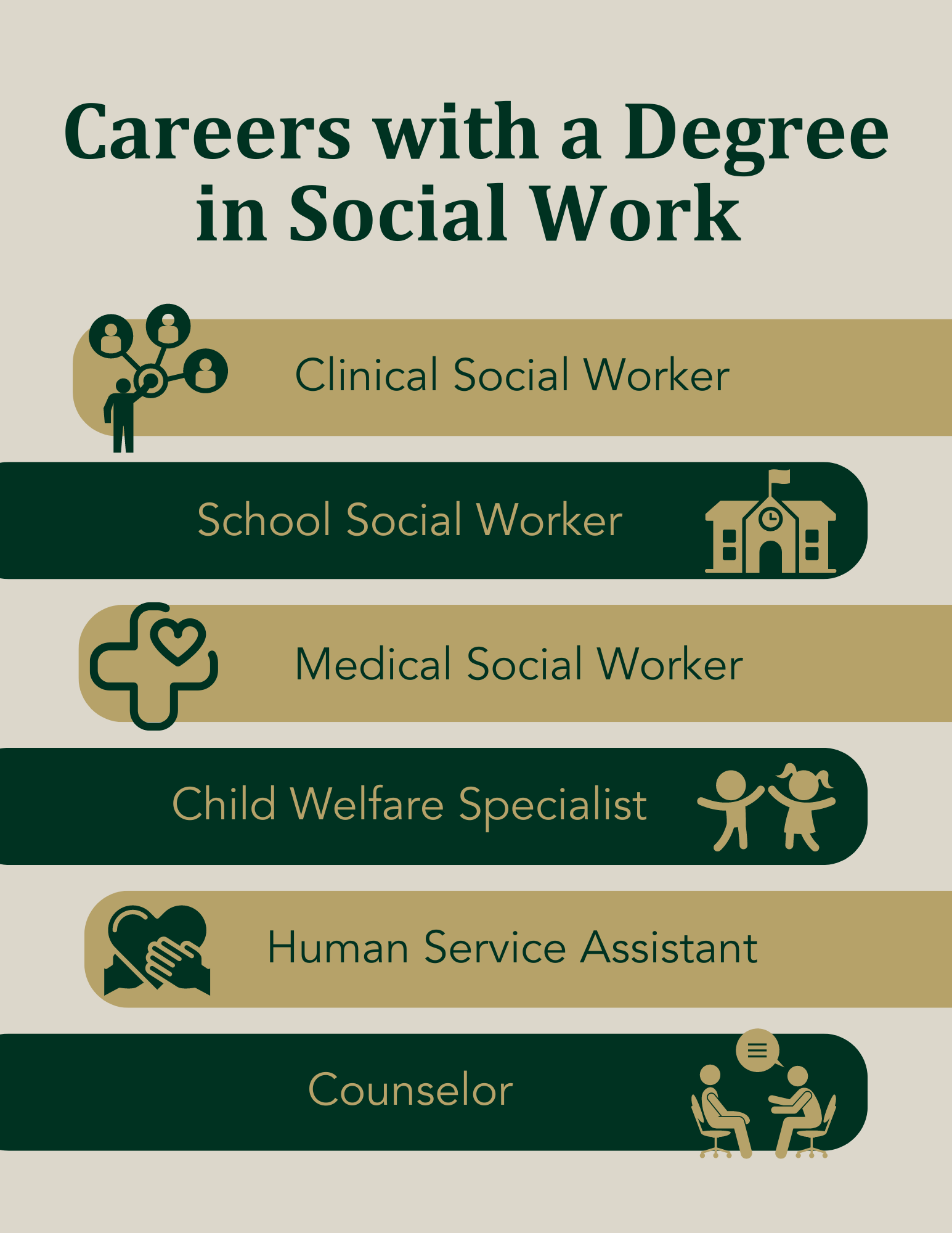
Are you recognized for your compassion and dedication to service? Do you want to help create comfort, stability, and positive change in the lives of people of all ages? Are you intrigued by the complexities of diversity, its origins, and its impact on individuals and communities? If so, a career in social work may be a great fit for you.
Whether you're drawn to client interaction, policy analysis, or community advocacy, a B.A. in Social Work equips individuals to affect meaningful change for individuals, families, and communities.
In this article, we'll explore the career paths available to social work graduates, from entry-level positions to advanced roles requiring specialized training and licensure.
What is Social Work?
Social work is “a profession devoted to helping people function the best they can in their environment,” according to the National Association of Social Workers.
Social workers often serve as advocates, counselors, and facilitators, working across various settings, such as:
- Schools
- Hospitals
- Government agencies
- Nonprofit organizations
They address a wide range of social issues — including poverty, mental health, substance abuse, domestic violence, and child welfare — and strive to promote social justice through direct service, advocacy, and policy interventions.
Put best by the Bureau of Labor Statistics, “Social workers help people solve and cope with problems in their everyday lives."

Career Paths with a Social Work Degree
One of the most appealing aspects of a social work degree is its versatility. Social work graduates can pursue diverse career paths tailored to their interests and strengths, including the following:
Clinical Social Worker
Clinical social workers provide therapy and counseling services to individuals, families, and groups facing mental health challenges, substance abuse issues, or interpersonal conflicts. They assess clients' needs, develop treatment plans, and offer ongoing support for healing and recovery.
According to the Bureau of Labor Statistics (BLS), the median annual wage for clinical social workers was $57,630 in May 2020, with a projected job growth of 13% from 2020 to 2030.
School Social Worker
School social workers support students' academic success and overall well-being. They address various issues affecting students, such as:
- Behavioral problems
- Learning disabilities
- Family crises
- Social-emotional difficulties
School social workers collaborate with educators, parents, and community resources to create supportive educational environments.
The median annual wage for social workers, including school social workers, was $51,760 in May 2020.
Medical Social Worker
Medical social workers work in healthcare settings; assisting patients and their families cope with illness, injury, or disability. They provide emotional support, facilitate communication between patients and healthcare providers, and connect individuals to community resources for supplemental support and services.
The median annual wage for healthcare social workers was $57,630 in May 2020, with a projected job growth of 14% from 2020 to 2030.
Child Welfare Specialist
Child welfare specialists work in government agencies or nonprofit organizations to protect children from abuse, neglect, or exploitation. Specialists may:
- Investigate allegations of maltreatment
- Assess families' needs
- Develop safety plans to ensure the well-being of vulnerable children
- Facilitate adoptions
- Provide ongoing support to foster families
The median annual wage for social workers specializing in child, family, and school services was $48,430 in May 2020.
Human Service Assistant
Community organizers and advocates work to address systemic issues and promote social change at the most basic level. They:
- Provide client services such as rehabilitation, social work, or psychology
- Advocate for policy reforms
- Connect clients with services available to them, such as food stamps and Medicaid
- Raise awareness about social justice issues (such as housing inequality, racial discrimination, or environmental justice)
Although salary data varies depending on the organization and location, individuals within social and human services within local government earned an average salary of $48,880.
Counselor
Counselors provide guidance, support, and therapeutic interventions to individuals facing life challenges. There are many branches of counseling; including but not limited to mental health counseling, substance abuse, and family therapy.
To become a counselor, most receive their Master of Social Work (MSW) degree with a concentration in clinical social work or counseling. An MSW provides advanced training, assessment techniques, and evidence-based interventions to prepare individuals for licensure and professional practice.
Then, aspiring counselors need to fulfill state-specific licensure requirements. Depending on your area of specialization and career goals, you may pursue licensure as a Licensed Professional Counselor (LPC), Licensed Marriage and Family Therapist (LMFT), or Licensed Clinical Social Worker (LCSW), among other credentials.
There are also Licensed Professional Clinical Counselors (LPCCs), which are different from LPCs. Interested in learning more? Read on for the differences between an LMFT and LPCC.
As a licensed counselor, you'll identify client goals, develop treatment plans, and facilitate positive change in a variety of locations:
- Mental health clinics
- Private practices
- Schools
- Hospitals
- Community agencies
Counseling offers competitive salaries and prospects for qualified professionals. The median annual wage for substance abuse, behavioral disorder, and mental health counselors was $47,660 in May 2020. As the demand for mental health services continues to rise, counselors are in high demand.
Read on for more social work jobs and career paths.
______
Who are you called to be?
______
What’s the difference between BSW vs. MSW?
When considering a career in social work, prospective students may choose between pursuing a
Bachelor of Arts in Social Work (BSW) or a Master of Social Work (MSW) degree. While both degrees provide a solid foundation in social work practice, they differ in scope, depth, and career opportunities.
Bachelor of Social Work degree
A Bachelor of Social Work (BSW) program focuses on foundational knowledge and skills in social work practice, including:
- Case management
- Counseling techniques
- Social policy analysis
BSW graduates typically qualify for entry-level positions in social services agencies, schools, or community organizations. Individuals seeking advanced clinical or administrative roles may pursue an MSW degree.
Master of Social Work degree
A Master of Social Work (MSW) program offers advanced training in specialized areas of social work practice. For example:
- Clinical therapy
- Macro-level interventions
- Specific populations (e.g., children, adolescents, older adults)
MSW graduates have opportunities to pursue licensure as a Licensed Clinical Social Worker (LCSW) and may qualify for leadership positions in mental health agencies, healthcare settings, or government agencies.
Other Licenses and Certifications
In addition to earning a social work degree, individuals may pursue additional licenses and certifications to enhance their credentials and expand their career options. Common social work credentials include:
Licensed Clinical Social Worker (LCSW)
Licensed Clinical Social Workers (LCSWs) are authorized to provide clinical therapy and counseling services independently. LCSWs must meet state-specific licensure requirements, including supervised clinical hours and passing a licensure exam.
Certified Social Work Case Manager (C-SWCM)
Certified Social Work Case Managers (C-SWCMs) coordinate services and resources for individuals with complex needs (i.e. those experiencing homelessness, chronic illness, or disabilities). Certification as a C-SWCM demonstrates expertise in case management principles and practices.
Certified School Social Work Specialist (C-SSWS)
Certified School Social Work Specialists (C-SSWSs) pursue certification to demonstrate competency in addressing students’ social, emotional, and behavioral needs. While certification requirements vary by state, C-SSWSs may need specialized training and examination.
Social Work at PLNU
Let it be known: a Bachelor of Arts in Social Work at PLNU is a unique blend of theory and action-oriented classes. This blend helps individuals develop skills to promote social and economic justice, empower diverse populations, and understand human interactions in social and cultural environments.
A sample of classes for our B.A. in Social Work include:
- Human Biology and Bioethics
- General Psychology
- Sociology of the Family
- Living Justly in Contemporary Society
- Social Welfare Policy
- Child Welfare
- Sociology of Aging
- Race and Ethnicity
- Human Behavior in the Social Environment
Additionally, as a PLNU social work major, you will complete 400 internship hours of hands-on practice in the community.
Lastly, PLNU's social work program is accredited by the Council on Social Work Education (CSWE), which emphasizes service-oriented, evidence-based learning that prepares students for professional practice.
Take the next steps toward making an impact
Whether you're just beginning your academic journey or considering a career transition, a degree in social work opens doors to a fulfilling and impactful profession. Between client practice, policy advocacy, and community organizing, social work allows you to make a meaningful difference in the world.
Take the next steps towards making an impact at Point Loma Nazarene University and check out our Social Work B.A. program and M.A. in Clinical Counseling.

